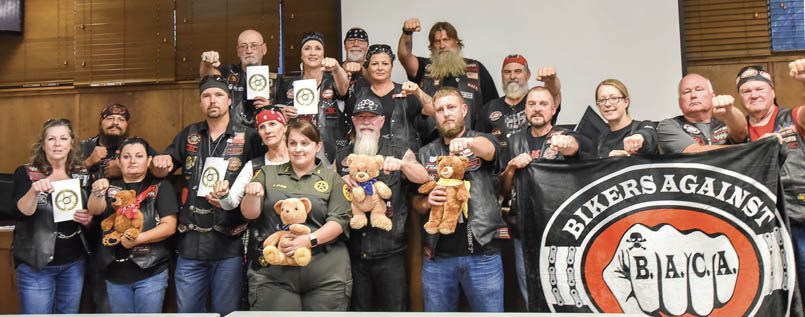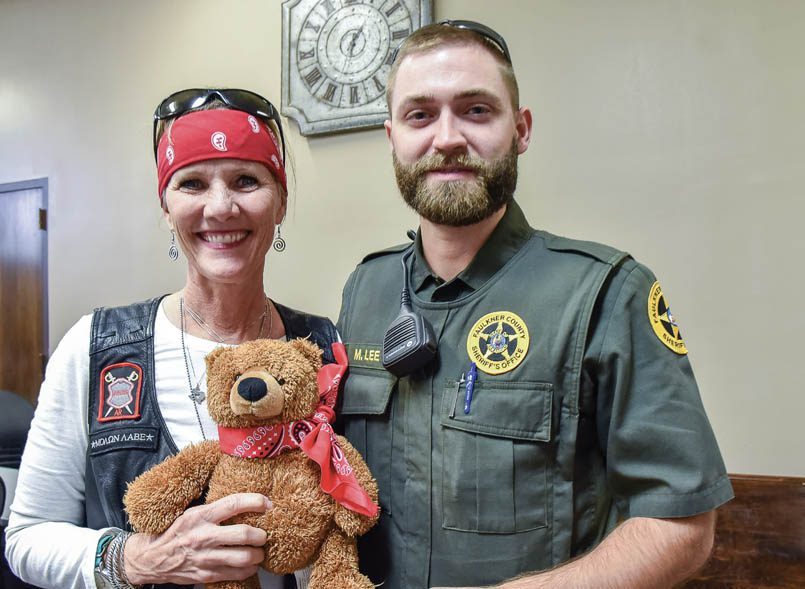16 Nov 2018 BACA advocating for local children
Story and photos
by Robin Richards
There are fictional super heroes and real heroes who protect our country and communities. Then there are real, unseen heroes, men and women, who live among us. They wear leather uniforms with special headgear and ride chrome steeds, and some men’s faces are disguised under heavy facial hair. They unite to empower abused children.
Bikers Against Child Abuse (BACA) and Faulkner County Sheriff’s Office Deputies met this fall to become familiar with each other and share how BACA works with law enforcement on child abuse cases.
“The purpose of this meeting was to get the deputies in here to learn what they [BACA] can do,” said Faulkner County Sheriff’s Office Public Information Officer Erinn Stone. “When they [deputies] come upon a child, they can give out the hotline number, and then they [child advocacy officials and law enforcement] can reach out.”
Stone indicated a relationship between BACA and deputies adds another tool.
In White County, BACA, local law enforcement, the prosecutor, the safety center, child advocates and therapists work together on a child abuse case to meet the child’s needs. The goal is to implement the very same system in Faulkner County.
BACA members use a biker moniker (or “road name”) to hide their true identity for their own safety. BACA members, who call themselves a family of brothers and sisters, may be involved in a case that could potentially be a threat. “We are not that well liked in certain aspects of the community because there are a lot of people out there that just don’t like what we do,” said one BACA member. “Family members are affected by our children speaking up, so we protect ourselves.” (For security purposes, BACA road names are used throughout the story.)

“BACA exists to empower children to not live in fear of the world in which they live. That is our mission statement,” said Rags, a seven-year BACA member.
There are seven Arkansas BACA chapters. Each uses standardized practices and shares best practices. When a chapter wants to try a different practice, it has to pass the child empowerment test. If it doesn’t, it’s not implemented.
BACA members go through 12 to 18 months of training before becoming official participants. Most BACA members are not therapists. College professors and mental health professionals assist in the training. Shrink, a professional child psychologist, rides with the Searcy chapter.
“Not everyone is a fit for what we do. The training will tell us who are a fit to ride with us,” said Rags. “The Searcy BACA chapter is the busiest because of new cases and court cases. There’s no more abuse there than anywhere else. It’s because of our agency relationships and strategy. Our Arkansas strategy is better because we focus on our relationships with local agencies.”
The BACA process is meticulously slow as it guides the abused child’s mental state toward feeling empowered and safe. Along the way, the child learns truth, honesty, family inclusion and eventually trusts again. A level one treatment process begins during the initial introduction.
As Rags explains it, “The child’s state of mind at that moment is in fight, flight or freeze mode. A child’s brain is chaotic, hypersensitive or hypervigilant. When they are in that state, then the empowerment starts when the child watches a video. I might talk to these guys and a little bit of empowerment starts there, too.”
The intake process involves many queries that need answers, but Rags addresses what will not be asked during the intake. “We don’t ask the details of the abuse. We don’t ask what happened. As far as we might ever get is the nature of the abuse. We want to try to understand the nature of the threat.” The threat assessment taken during the intake not only serves the child, but also identifies any possible threats to BACA members.
As the intake process progresses, a relationship between BACA members and the child becomes inclusive by asking the child to pick a road name, getting the child’s leather jacket size and asking if the child wants to become part of the BACA family. The child is given a leather jacket or a vest called “cuts” with the chosen road name printed on the front and back, plus a set of dog tags with the name. The child learns empowerment through the choices.

The next phase re-evaluates the child’s needs when revisited by two to four BACA brothers and sisters. This visit assesses the case’s validity and if the child should be brought into the BACA family. If the case is valid, then the child is asked again if they want to be a BACA family member. The child has to give a verbal answer before being added.
“When we say family, we’re not talking about replacing mom and dad,” Rags said. “We focus on empowering that child, and we focus on fear. We’re not there to give Christmas presents, birthday presents, attend birthday parties or any of that. When we ride in, just like we did in the initial visit, everything is choreographed, everything we do is for a reason and everything is detailed. We do things in the same order every time. Typically, before we’re done, we just play.” They use experiential therapy to guide the child from trauma to the other side of a good life while supporting the child along the way.
The BACA family impresses certain values and expectations upon the child after joining their family. An impactful conversation takes place about telling the truth. BACA members stress they will never lie to the child, and the child must agree to never lie to them.
“We do that to set it up so that at the end and during the entire process they learn that we are not lying to them, and we prove it,” Rags said. “They learn we set expectations. If we make 10,000 promises to a child, and we keep 9,999 of them, we failed. If we set an expectation, we have to meet it. We do that every step of the way. That I don’t lie to you and you don’t lie to me part comes into play very, very prominently down the road.”
A child’s fear is often alleviated, and they feel comforted when accompanied by BACA into and out of the courtroom if there is a court case. BACA’s presence receives the judge’s permission, and court staff is informed also. A coin, dog tags or a teddy bear is given to the child, or cuts can be worn, to calm the child. If there is a final disposition that day, the child is recognized as being a hero because they spoke out against the abuser, and celebrates a victory ride with BACA brothers and sisters.
The relationship between BACA and the children may continue after being deemed safe by exchanging cell phone numbers. The group intentionally fades out of children’s lives to allow them to live their best lives on their terms.
If anyone suspects a child is being abused, call the child maltreatment hotline at 1.800.482.5964.











